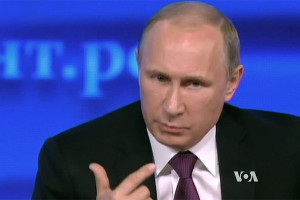RUSSIALINK: “Catherine Belton’s “Putin’s People” is Essential Reading: ‘How the KGB Took Back Russia and then Took on the West.'” – Moscow Times

(Moscow Times – themoscowtimes.com – Emily Couch – Oct. 17, 2021)
The path taken by Catherine Belton’s “Putin’s People: How the KGB Took Back Russia and then Took on the West” is a well-trodden one. For those who have read Masha Gessen’s “The Man Without a Face: The Unlikely Rise of Vladimir Putin,” Ben Judah’s “Fragile Empire: How Russia Fell In and Out of Love with Vladimir Putin,” and – most recently – Mikhail Zygar’s “All the Kremlin’s Men: Inside the Court of Vladimir Putin,” the contours of Belton’s tale will be familiar. The unassuming KGB operative in Dresden, “the Family’s” mistaken belief that this former-operative could be controlled, the theories about the horrific 1999 apartment bombing, the Yukos Affair – the well-known vignettes of Putin’s ascent and consolidation of power are all here.
 What sets Belton’s telling of this story apart is the spotlight she turns upon the KGB’s role in the collapse of the Soviet Union and the rise of a revanchist Russia. Far from being the ruthless defenders of Marxist-Leninism that the Western imagination might believe them to be, the security service, she argues, saw communist ideology as a millstone preventing the Soviet Union from successfully rivalling the West. The corruption of Western institutions and politicians, Belton asserts, is part of the “KGB capitalism” that governs Russia’s political and economic life.
What sets Belton’s telling of this story apart is the spotlight she turns upon the KGB’s role in the collapse of the Soviet Union and the rise of a revanchist Russia. Far from being the ruthless defenders of Marxist-Leninism that the Western imagination might believe them to be, the security service, she argues, saw communist ideology as a millstone preventing the Soviet Union from successfully rivalling the West. The corruption of Western institutions and politicians, Belton asserts, is part of the “KGB capitalism” that governs Russia’s political and economic life.
One of the book’s most interesting contentions is that the apparent rise of the Russian Orthodox Church post-2012 has little to do with conservative ideology and everything to do with maintaining the kleptocratic Putin regime. “Most of this newfound religious zeal,” writes Belton, “was in fact no more than cover. Inside Russia, the joining of Church and state was just another element of the erosion of any remnants of democracy.” Belton’s portrait of Konstantin Malofeyev – the shadowy founder of the Saint Vasily the Great Foundation who also happens to sit on the boards of state telecom giants Svyazinvest and Rostelecom – who forged many of Russia’s links with European far-right and far-left parties, is illuminating.
The author’s writing style is anything but dry. There is a bit of Charles Dickens – rarely does she introduce a character without a thumbnail description of their appearance, mannerisms, or personality – and John le Carré, to whom she gives a nod in the Chapter 3 subtitle “Submariner, Soldier, Trader, Spy.” The vivid scene-setting that opens Part One embodies the noir, crime novel feel: “St Petersburg – it’s early February 1992, and an official car from the city administration is slowly driving down the main streets of the city. A grey slush has been partially swept from the pavements, and people are trudging through the cold in thick anonymous coats, laden with bags and hunched against the wind.”
Belton’s focus on the complex connections between the Russian state, security apparatus, and organized crime comes at a timely moment as Western countries wake up, albeit belatedly, to the global challenges posed by kleptocracy. Defined by Merriam-Webster as “government by those who seek chiefly status and personal gain at the expense of the governed,” the phenomenon is receiving increased media and political attention on both sides of the Atlantic. Her detailed depiction of the corrosive impact of KGB capital serves as a disturbing reminder of just how complicit the West has been – and, indeed, continues to be – in creating its own adversary.
Belton neatly sums up the damning verdict in the final chapter: “…the West’s backing of the Kremlin’s takeover of his company and its usurping of the rule of law facilitated the domination of Putin’s security men, and furthered their integration into Western financial markets. The weakness of the Western capitalist system, in which money ultimately outweighed all other considerations, left it wide open for the Kremlin to manipulate.”
Overall, Belton delivers a searing indictment of both the KGB men who undermined any hope for democracy in Russia and of the West for punishing the Putin regime with one hand while accepting its dirty money with the other. “Putin’s People” is a must-read for all those interested in the tragic and twisted development of Russia’s political and economic system.
[article also appeared at themoscowtimes.com/2021/10/17/catherine-beltons-putins-people-is-essential-reading-a75310]
